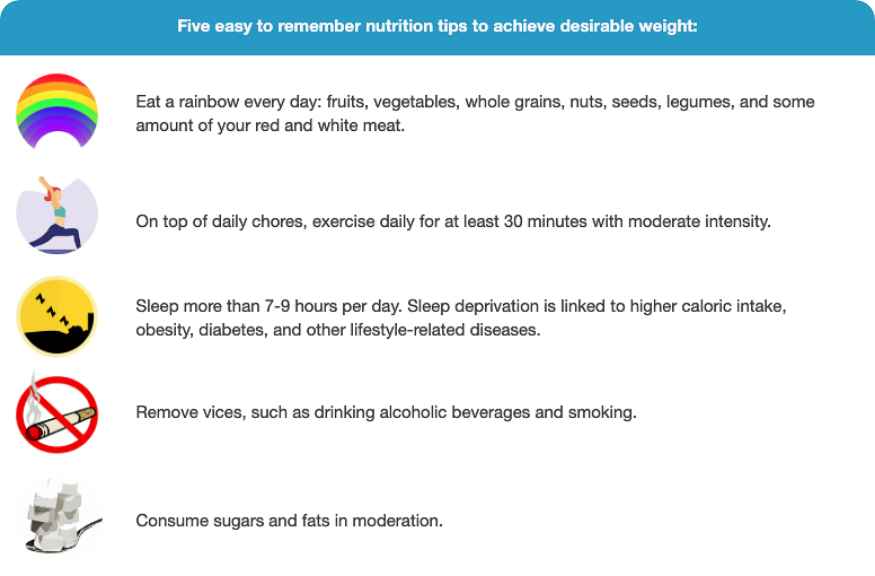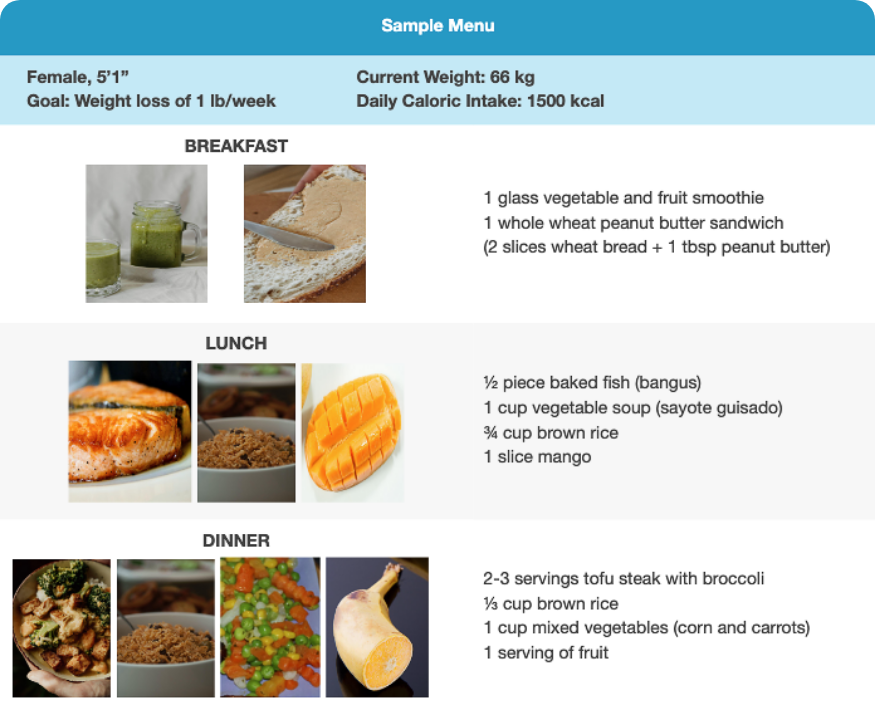Introduction
Fad diets are unsafe, unhealthy, and most of all, lacking evidence. However, fad diets got all the hype and have been given the spotlight for decades. The misinformation baked into these trendy ways of eating has made the work of RNDs a lot harder and so, through the years, RNDs have been giving pieces of advice as well as highly instructive charts that demonstrate how to eat healthily. The question now is: why are fad diets, which are largely experimental and have nothing but anecdotal evidence as backup, still more popular than the tried-and-tested diets from experts and institutions?
In this article, we meet Dr. Dex Macalintal, a Registered Nutritionist-Dietitian and Lifestyle Doctor, to take apart the most popular diets of the past and present.
NM: Hi Doc Dex, before we start talking about fad diets, please tell us something about yourself and the field of lifestyle medicine.
Dr. Dex: I took up BS Nutrition from the University of the Philippines Los Baños and landed my first job as an RND for a city government. Eventually, I went to medical school in De La Salle Medical and Health Sciences Institute. When I started my practice as a general practitioner, I found nutrition highly interesting, and so I studied lifestyle medicine under the American College of Lifestyle Medicine.
According to the American College of Lifestyle Medicine (2018), “Lifestyle Medicine is the use of evidence-based lifestyle therapeutic intervention—including a whole-food, plant-predominant eating pattern, regular physical activity, restorative sleep, stress management, avoidance of risky substances, and positive social connection—as a primary modality, delivered by clinicians trained and certified in this specialty, to prevent, treat, and often reverse chronic disease.”
Lifestyle medicine has allowed me to see medicine in a new light, one that is more than just prescribing medicine but about examining underlying causes and making the public realize how food can be medicine. That’s the power of nutrition.
What are fad diets?
NM: Let’s now get to the meat of the discussion. What are fad diets?
Dr. Dex: These are diets that sound too good to be true like those that say “lose 15 pounds in seven days”. Fad diets usually recommend eating a single food on a very consistent basis. They usually promise quick and easy weight loss with little to no effort, and this promise is supposedly done by eliminating entire food groups, such as carbohydrates or dairy. Moreover, fad diets guarantee outcomes in a specified period, and the basis or evidence for their effectiveness is only anecdotal, usually coming from celebrities.
| Common characteristics of a Fad Diet (NNC Governing Board, 2019): | |
|---|---|
| |
Are diets effective in weight loss?
NM: Some diets are used for specific medical conditions or as transition diets, but have been advertised as effective in inducing weight loss in apparently healthy individuals. What can you say about this?
Dr. Dex: Many diets are indeed taken out of context or purpose. For example, pure liquid diets are used as therapeutic diets for post-surgical cases. In this case, the diet is being used for the correct purpose. It does have a side-effect: the patient loses weight. This side-effect can then become the banner feature or selling point of a fad diet.
Another diet like this is the ketogenic diet. It’s used as a therapeutic diet for patients with epilepsy refractory to medications. There’s a side effect of weight loss that comes with it, but this doesn’t mean keto is truly safe to be used outside its therapeutic context.
Strictly speaking, the pure liquid diet and ketogenic diet are not ‘fad’ diets. They’re simply being used because of their side effects, and this can be detrimental to the health of a misguided dieter.
Fad Diet: Calorie Counting
NM: Tell us about some of the most popular fad diets in recent years, and why they don’t work.
Dr. Dex: Here are some of it.
1. The Calories Don’t Count Diet
Exaggerated Claims: The Calories Don’t Count Diet instructs dieters that there is no need to count calories. It also promotes the consumption of high-fat and high-protein food such as fish, fried food, meats, cheese, eggs, and shelled nuts, as well as tea, coffee, and diet soda. By eating all these and avoiding only carbohydrates, this diet promises effortless weight loss.
Dispelling the Claim: The principle is to use fat and protein (which are not ready sources of energy), as the main sources of energy. This is an inefficient process. We know that carbohydrates, which are eliminated from this diet, are converted to glucose, which is the universal fuel of the body. One of the highest glucose consumers is the brain. Hence, a diet should supply sufficient carbohydrates to provide the brain with enough glucose, plus a safety bracket of around 50%. This diet will definitely cause weight loss. However, decreased intake of fruits and vegetables result in deficiencies in Vitamins B1, B9, C, and E, as well as calcium and magnesium which are found in whole plant foods, thereby putting individuals at risk for health problems related to the lack of said vitamins and minerals.
Fad Diet: Paleo Diet
2. Caveman or Paleo Diet
Exaggerated Claim: The Paleo Diet instructs dieters to only eat fish, meat, shellfish, eggs, veggies, root crops, fruits, and berries, as well as to avoid grains, dairy, legumes, sugar, and salt. The concept of Paleo hinges on the supposed genetic predisposition of the body to eat like our ancestors, the cavemen.
Dispelling the Claim: As it eliminates food groups (e.g., grains and legumes), the Paleo Diet poses a risk for fiber deficiency which may lead to higher risks of hypertension and stroke, and deficiencies in calcium and Vitamin D which are critical in bone development. Moreover, the paleo diet is difficult to sustain and it increases the risk of developing disordered eating. A sound diet for a healthy population should have a distribution of 45%-60% carbohydrates, 10%-20% protein, and 20%-30% fat. The caveman diet goes against this recommendation by prioritizing proteins and fat sources. Moreover, a high-fat diet may promote systemic inflammation, which may then lead to chronic degenerative diseases, such as hypertension, diabetes, heart diseases, and cancer.
Fad Diet: High-Protein Diet
3. High-Protein, Low-Calorie Diets
a. Atkins Diet
Exaggerated Claim: According to the Atkins Diet, you can lose weight even if you eat as much protein and fats as you want, just avoid sugar, grains, vegetable oils, high-carbohydrate vegetables, high-carbohydrate foods, starches, and legumes.
Dispelling the Claim: Again, a high-fat and high-protein diet may promote inflammation. Specifically for a high-fat diet, there is an increased risk for systemic inflammation, which can lead to insulin resistance, as well as Type II diabetes, cardiovascular diseases, intestinal diseases, and cancers thru activation of inflammatory pathways2. Moreover, eliminating fruits and vegetables decreases the assimilation of vitamins and minerals. This promotes deficiencies and toxicities in the substrates of metabolic pathways, eventually leading to clinical manifestations, such as chronic fatigue and pain. In a study by Beisswenger et al. (2005), ketosis produced by the Atkins diet promotes increased methylglyoxal production, which is a significant factor in blood vessel and tissue damage. In 14-28 days, methylglyoxal was found to be increased by 1.67-fold in subjects on the Atkins diet3. Due to the elimination of fruits and vegetables, there’s a risk for vitamin (B12, C, E, and D) and mineral deficiency. Moreover, Atkins dieters usually go into ketosis and experience brain fog, or difficulty in focusing. This diet is also difficult to sustain in the long term.
b. South Beach Diet
Exaggerated Claim: According to the South Beach Diet, there are ‘good’ and ‘bad’ carbohydrates. Dieters are instructed to eat more ‘good’ carbs, such as whole-wheat pasta and brown rice, and avoid ‘bad’ carbs, such as white rice and potatoes. Moreover, this diet encourages the consumption of lean meat, fish, and unsaturated oils and tells dieters to stay away from fatty meat, cheese, and sweets. Starchy carbohydrates and fruits are also discouraged in the first two weeks.
Dispelling the Claim: Losing weight should not be drastic. In the first phase of the South Beach Diet, a person may lose 8-13 pounds in a two-week period, which is a drastic rate of weight loss. Weight loss should be kept at a steady pace because the human body has a set point at which weight loss would halt if the body perceives starvation. Losing a lot of weight in a short time activates this set point, which would decrease the Basal Metabolic Rate of the body, which then decreases the magnitude of weight loss. Ultimately, this may cause the weight to bounce back, also called ‘yo-yo cycling’. As a reference, the ideal weight loss is around 1-2 lb/week. Considering 1 lb body weight is equivalent to 3500 kcal, food intake should be decreased by 500-1000 kcal/day. Severely restricting carbohydrates may lead to ketosis, which can cause nausea, headaches, mental fatigue, halitosis, dehydration, and dizziness.
Fad Diet: Ketogenic Diet
4. Ketogenic Diet
Exaggerated Claim: The Ketogenic Diet recommends a high-fat, moderate-protein, and very low-carbohydrate intake to lose weight. The Ketogenic Diet causes ketosis. In the absence of carbohydrates, the body breaks down fat into ketones, which then becomes the primary fuel source of the body.
Dispelling the Claim: The ketogenic diet has the potential to aggravate pancreatic disease, liver conditions, thyroid problems, eating disorders, and gallbladder disease, as well as increase the risk for heart disease and other chronic health problems. Moreover, despite claims that it can “reverse” diabetes, this diet only reverses high blood sugar, which is only a symptom of diabetes. The high cholesterol, saturated fat, and trans-fat levels of this diet may lead to inflammation, which then destroys our body cells. Therefore, insulin receptors get affected, which can worsen diabetes. The Ketogenic Diet is restrictive and therefore has a high dropout rate in clinical studies.
As mentioned earlier, a high-fat diet promotes low-grade systemic inflammation, which activates cellular signaling that turns on proto-oncogenes. This cascade gives rise to certain cancers. Moreover, aside from inflammation, a high-fat diet promotes the activation of cellular signals that retard insulin sensitivity, thereby promoting insulin resistance and type II diabetes mellitus, as well as cardiovascular diseases.
Furthermore, this diet recommends a very low intake of carbohydrates, which are a ready source of energy. Therefore, the ketogenic diet does not provide enough fuel (in the form of glucose) to the body. Remember that the brain requires a high level of glucose at around 120 g/day, plus a safety buffer of around 50%. Limiting carbohydrate intake would mean decreasing the consumption of fruits, vegetables, and whole grains, which are rich sources of vitamins, minerals, and antioxidants that help fight inflammation.
Aside from being a ready source of energy, carbohydrates also act as a ‘protein-sparer’. Removing or limiting carbohydrates leads to muscle loss, as protein takes the place of carbs as the energy source. In a study by Kephart et al. (2018), body composition, blood parameters, and performance metrics of Crossfit trainees that were subjected to the ketogenic diet were decreased by 8%, based on the thickness of the subjects’ vastus lateralis.4 Similarly, other studies show muscle wasting secondary to taking up the ketogenic diet.
The ketogenic diet touts the Carbohydrate Insulin Model of Obesity as its basis for weight loss.5 However, this failed experimental interrogation.
The weight loss that happens in the ketogenic diet is due to losses in water weight and muscle, as demonstrated in a study by Kevin Hall et al. (2016).6 The study shows that while the ketogenic diet promotes a higher weight loss than that in a balanced diet, the former has lower fat loss than the latter, and this disproves the Carbohydrate Insulin Model of Obesity. In counteracting obesity, decreased body fat is as much a goal as weight loss. Weight is simply the sum of water, muscle, bone, and fat.
NM: The ketogenic diet is indicated for epilepsy, yet mainstream media has touted this diet for its fast weight loss effects. Why do you think the ketogenic diet is being misused as a fad diet?
Dr. Dex: In epilepsy, there is a disrupted balance of excitatory and inhibitory signals in the brain that results in seizure activities. Simply put, using the ketogenic diet may result in a reduction in neuronal excitability, thereby reducing seizure occurrence by around 50% in about half of epileptic patients.
NM: The ketogenic diet is indicated for epilepsy, yet mainstream media has touted this diet for its fast weight loss effects. Why do you think the ketogenic diet is being misused as a fad diet?
Dr. Dex: In epilepsy, there is a disrupted balance of excitatory and inhibitory signals in the brain that results in seizure activities. Simply put, using the ketogenic diet may result in a reduction in neuronal excitability, thereby reducing seizure occurrence by around 50% in about half of epileptic patients.
Table 1. Main features of the ketogenic diet
| Main Features of the Ketogenic Diet | |
|---|---|
| Low in Carbohydrates | Fruit intake is restricted to small amounts. Vegetable intake is restricted to leafy vegetables. Broccoli, bell peppers, onions, garlic, mushrooms, and cucumber are also included in the diet. |
| High in Fat | Higher consumption of saturated fats (butter, lard, coconut oil, animal products) Lessened unsaturated fats (such as those from nuts) |
Dr. Dex: The ketogenic diet promotes increased levels of ketone bodies, particularly acetoacetate and beta-hydroxybutyrate, and these ketone bodies may act as an alternative energy source for the brain. Inside the brain, there are excitatory and inhibitory neurotransmitters, namely, glutamate and gamma-aminobutyric acid (GABA); with the former being excitatory and the latter, inhibitory. Changes in glutamate and GABA levels may either increase excitation or inhibition of impulses promoting seizures.
Aside from being an energy source, ketone bodies also act as modulators of glutamate and GABA production. To illustrate this mechanism, GABA is an intermediate of the Krebs Cycle using the GABA SHUNT. Glutamate is converted to GABA via glutamate decarboxylase. However, this enzyme is inhibited by ketone bodies, thereby promoting decreased GABA levels. Decreased GABA levels signal the body to stimulate GABA synthesis, thus making the system less excited and more inhibited.
Some studies show that animals fed with the ketogenic diet have higher levels of beta-hydroxybutyrate in the brain, particularly the forebrain and cerebellum, thus suggesting higher GABA levels.7 Synthesis of more GABA favors the inhibition of neuronal firing and increased inhibition of neuronal firing means decreased excitability, thereby influencing the normal functioning of the brain to control seizures. On another note, higher GABA levels may also stimulate chloride channel receptors, thus promoting the increased influx of negatively charged ions into the cells, which induces hyperpolarization of the neurons, hence reducing seizures. It must be noted, however, that there seems to be a better response in children than in adults due to the higher levels of ketone-metabolizing enzymes in the brains of children than in adults.
In the ketogenic diet, the body is deprived of a ready source of energy, thus the patient will lose weight through the ketogenic diet. This is a shortsighted approach to health and wellness.
Demographics and Social Media
NM: Which age group, gender, socioeconomic class in the Philippines are most prone to taking up fad diets?
Dr. Dex: In terms of age group, these are usually the most prone to body dysmorphic disorder - teenagers and those in their 20s going to their 30s. According to gender, there are more females than males. As for the socio-economic class, these are middle to upper-class. These groups tend to be more particular about how they look and they’re more prone to fad diets because of their longer exposure to TV and social media.
NM: In the age of social media, how do fad diets reach people, and what can healthcare professionals do to combat this?
Dr. Dex: In the age of social media, it’s very convenient for people to look up “how to lose weight”. However, most people also don’t know how to scrutinize the sources and the information they get. I believe that this problem needs to be addressed head on by healthcare professionals and institutions by utilizing popular online platforms. Misinformation needs to be intercepted by correct information.
Expert Advice
NM: What is your advice to people who keep going back to fad diets?
Dr. Dex: I ask them about their experience before, after, and during their current fad diet, or what they're eating. Then, I give information. The mindset is to just give information because most veteran fad dieters are close-minded. However, considering that they’re consulting me, they're probably in the contemplation or pre-contemplation stage, so I can probably influence them a bit. In doing this, I have to know where they are coming from, I have to know their mindset, then I give them more information.

NM: What are the expected changes to a fad dieter when they shift to a healthy diet?
Dr. Dex: There will be great positive changes in their mindset during the shift. You see, people who went on fad diets and then decided to finally take up a proper healthy diet, they’re more aware of the detrimental effects of their fad diets. They’re energized and excited, and most importantly, focused on following proper nutritional advice.
Moreover, we – a team of a lifestyle doctor, a psychologist, and others – explain to the patients what to expect in the long run. Some patients, after shifting to healthier diets, decreased their medicine intake because their other doctors told them they didn’t need some of the medicines anymore. I’m not saying that the goal is to completely replace medicine with food; I’m saying that there’s a way to use food the right way. If your diet is healthy, chances are, you can reverse your disease, especially those lifestyle-related. So, if the lifestyle gets fixed, the patient makes better and healthier choices, blood markers go back to normal, ultimately there’s less to treat or medicate for.
Table 2. Sample one-day menu plan for 1500 caloric intake
Plant-Based Diets
NM: Some people who want to lose weight shift to plant-based diets. Is this an effective route? Moreover, are there benefits from a plant-based diet aside from weight management?
Dr. Dex: First and foremost, plant-based foods are rich in fiber, which is known to help in weight management. A plant-based meal makes you feel fuller or “busog” while delivering fewer calories. To help in the weight loss effects of a plant-based diet, the right amount of exercise is needed, of course. Moreover, plant-based diets are rich in vitamins, minerals, and antioxidants, which decrease inflammatory signals in the body. Finally, plant-based diets can help decrease blood cholesterol, blood sugar, and PSA levels in men.
With vegans, the problem is they have a risk for health problems, specifically megaloblastic anemia (due to Vitamin B12 deficiency). Good thing that they can take vitamin supplements to make up for the lack of any meat in their diet. Aside from taking vitamin supplements, vegans can mix and match other plant-based foods to balance their diet and avoid vitamin deficiencies.
While these vegan and vegetarian diets avoid meat and other animal-based foods, they don’t exclude nutrient groups, specifically protein, because protein can be obtained from plants. Thus, these diets are different from fad diets. Remember that a diet is healthy as long as it is well-rounded and balanced to deliver all the required amounts of carbohydrates, proteins, fats, and micronutrients.
It all comes down to moderation, variety, and balance when it comes to plant-based diets. Of course, it would be best to consult your registered nutritionist-dietitian if you are considering a shift to a vegan or vegetarian diet.
NM: Thank you, Doc Dex. We gained a bigger perspective about fad diets and diets in general because of this interview.
Message to Nutritionists
As a final request, Doc Dex, can you share a short message to nutritionists about how they can improve the success rate of patients undergoing weight loss regimens?
Dr. Dex: Losing weight is never easy and this is the reason why fad diets evolved. Our role as nutritionist-dietitians is pivotal in making a patient’s weight loss journey a success. Remember to always be creative, as no two patients are alike in terms of their nutritional needs and an individualized approach has never failed in a patient’s progress. When taking your client’s history, always listen and put on your coach’s hat. It is important to learn their problems and draft your nutritional goals as a team. Collaboration makes the nutrition plan a binding contract between you and your client, and an important tool for monitoring.
Beyond fad diets, we still have a lot of work ahead of us: lifestyle diseases. It might seem like the biggest challenge in the world, but there are many of us in the profession. We are armed with the right knowledge and scientific evidence, and with these, we will spread the good word of nutrition. The sooner we do so, the better our chances of saving future generations. The time to act, step up, and speak out is now.
NM: Very empowering words. Thank you very much, Doc!
In the journey for wellness, diets are one key ingredient. Food is fuel and in the case of those with lifestyle-related diseases, a powerful medicine.
Dr. Dex Macalintal illustrates how wellness should have a holistic perspective, and not just based on weight and appearance. This is why fad diets are definitely not the right way to reach health goals. Fad diets are unsafe, unhealthy, and unsustainable. While the battle against unverified dietary advice may seem long, Dr. Macalintal is well-armed with knowledge and support - and fueled by healthy food.


 Marc Dexter M. Macalintal , RND, MD, DipIBLM, DPCLM
Marc Dexter M. Macalintal , RND, MD, DipIBLM, DPCLM















No comments here yet.